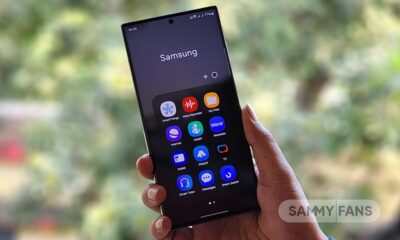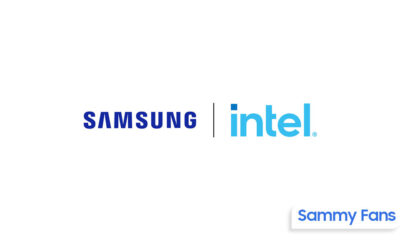Business
Samsung investing trillions on chip foundry in US

Samsung is always keen to solve upcoming issues and problems in the world. Recently US semiconductor companies are seen contacting Korean engineers experienced in EUV lithography due to its chronic manpower shortage.
‘BusinessKorea‘ reported that the shortage in manpower is because local manufacturing facilities are expanding fast. Therefore Samsung Electronics is planning to build a foundry in Texas by investing 20 trillion won, and many other companies like Intel will also invest a greater amount.
Join SammyFans on Telegram
Looking at the needs equipment suppliers are also increasing their employment for example we can see ASML is currently recruiting EUV lithography engineers in Texas in relation to the new foundry of Samsung Electronics.
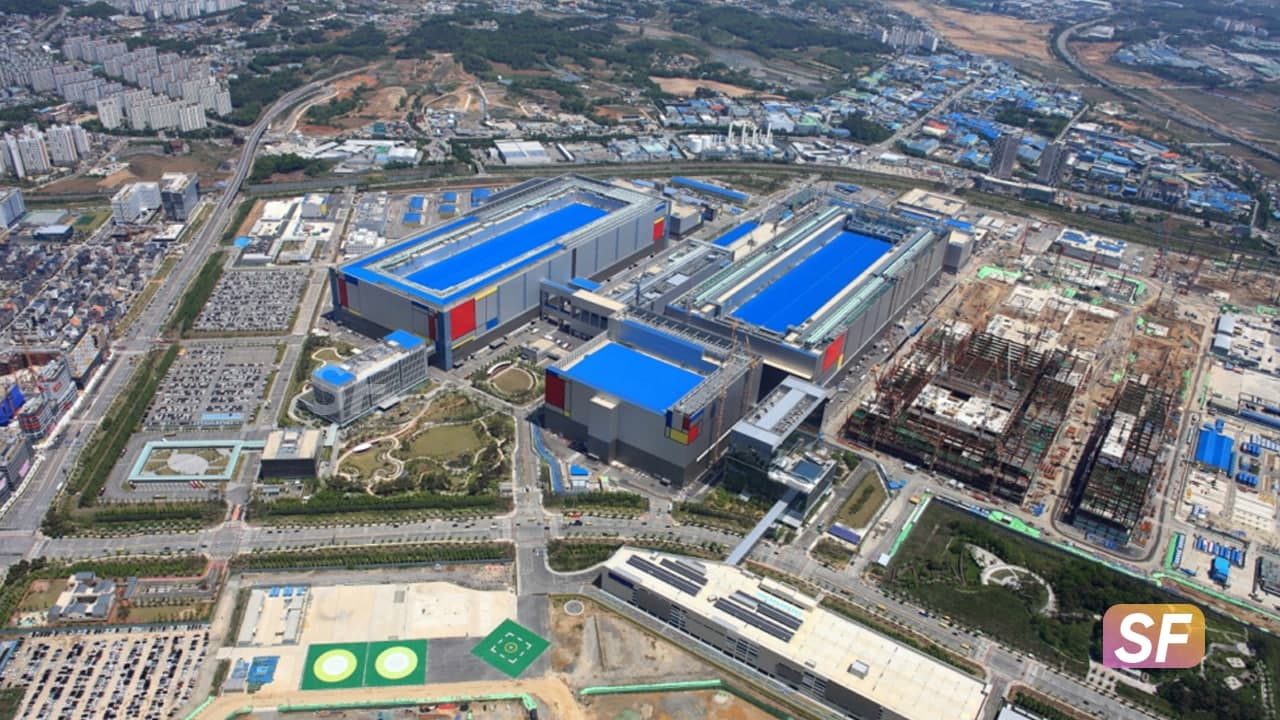
The reason behind this shortage is because as we see this EUV lithography technology evolved in South Korea and Taiwan and has been used for a couple of years, which is now quickly becoming mainstream tech now.
EUV Lithography used for?
EUV lithography is used to pattern the finest details on the most advanced microchips because it can pack more transistors onto a single chip. These chips can be mass-produced affordably, which also have more processing brainpower, use less energy, and have higher performance.
Adding to it the news firm said at present the US-based semiconductor companies are contacting a large number of South Korean engineers, experienced in this EUV tech that has been previously unstaffed by them, and now they are facing issues.
A manpower shortage is accelerating in the semiconductor industry in the U.S. Intel CEO Pat Gelsinger recently asked the U.S government to resolve the issue. looking at the post covid scenario Micron technology and TSMC, and many more are increasing their investment in the United States. If the concern keeps growing, we hope that the U.S government will surely take a business policy review to resolve this issue.
Business
Samsung leads Q3 smartphone market, Huawei’s entry haunts Apple
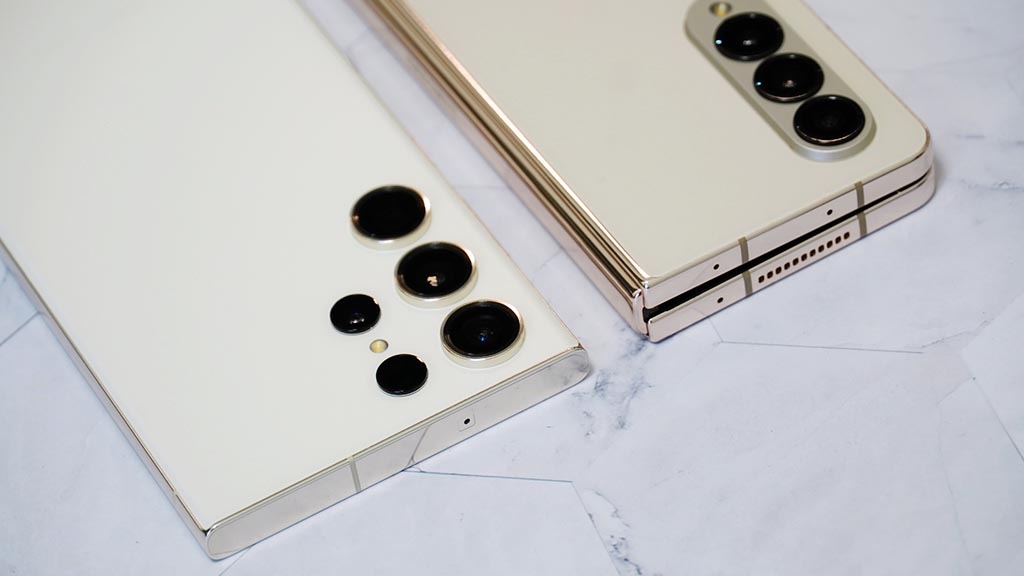
Samsung ranked first in market share in the global smartphone market in Q3, 2023. TrendForce report says that Samsung led the global Q3 smartphone market, recording a market share of 19.5%.
Overall production in the third quarter increased by 11.5% compared to the previous quarter to 60.1 million units. During the same period, Apple’s production increased by 17.9% to 49.5 million, thanks to iPhone 15.
Follow our socials → Google News | Telegram | X/Twitter | Facebook | WhatsApp
Third place was taken by Xiaomi (13.9%), followed by Oppo (12.6%) and Transion (8.6%). 6th place is Vivo (8%). Meanwhile, global smartphone production reached 308 million units, a 13% increase compared to the previous quarter and a 6.4% increase from the previous year.
Huawei’s re-entry into the flagship smartphone market targeting Apple has had a significant impact in China. Huawei is aiming to expand its high-end flagship series, focusing on the Chinese domestic market next year, so Apple “We plan to attack directly”.
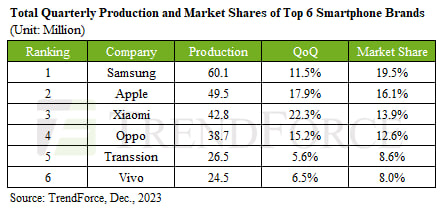
// Source
Business
Underdog phone brand jumped 50%, Samsung and Apple lost ground

In Q3 2023, Samsung and Apple’s market share slightly declined, while an underdog Chinese phone brand appeared on the top 5 chart. In a recent development, Canalys published market research data for the third quarter, revealing Tanssion as the fifth best-seller globally.
According to the info, Samsung and Apple lead total sales with 20% and 17% market share, yet both have fallen from their 22% and 18% levels in 2022. However, Tanssion, the maker of Tecno, Itel, and Infinix phones, climbed from 6% global market share last year to 9% in 2023, a 50% jump.
Follow our socials → Google News | Telegram | X/Twitter | Facebook | WhatsApp
Apart from this, Xiaomi matched last year’s share only by “recovering” from a terrible first half of 2023. At the same time, OPPO has fallen steadily over the past two years, while fellow BBK brand vivo lost the top-5 slot it’s owned for years.
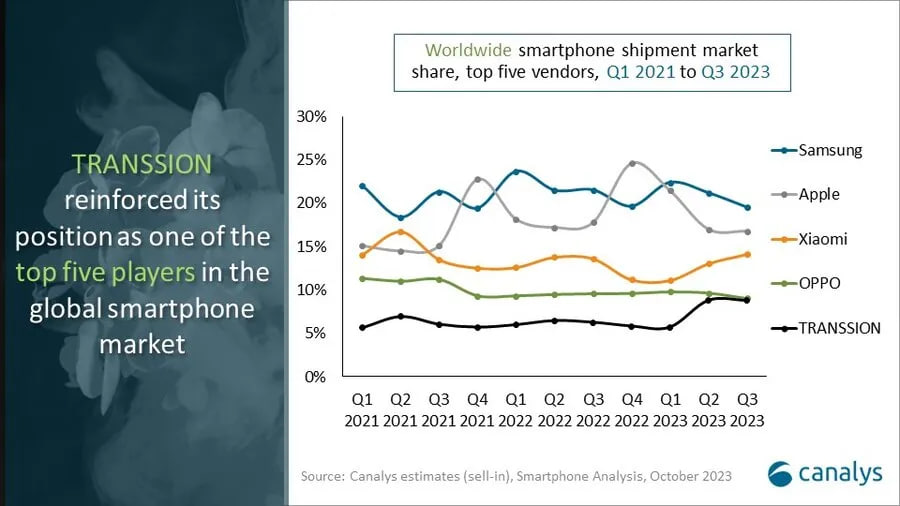
Overall, the global smartphone market underwent a slight drop of 1% in Q3 2023. Bolstered by regional recoveries and new product upgrade demand, the smartphone market recorded a double-digit sequential growth in Q3, ahead of the sales seasons.
Business
Samsung enjoyed 2023’s last victory over Apple?

Recently, research agency Counterpoint Research published their latest analysis. The report reveals that Samsung continued its leadership in the third quarter of 2023, while Apple remained in the second spot. However, both OEMs faced a decline of 1 percent year over year.
According to CR, slower consumer demand is the main factor in the dwindling sales. The market did see a slight 2 percent growth in Q3 compared to Q2, likely driven by last month’s iPhone 15 series launch. Samsung secured 20 percent market share, while Apple grabbed 16 percent sales.
Follow our socials → Google News | Telegram | X/Twitter | Facebook | WhatsApp
The Galaxy A-series was the key driver for the South Korean smartphone maker. Apple came in second with 16 percent of the market while Xiaomi rounded out the top three with its 12 percent share. Oppo (10 percent) and vivo (8 percent) were the remaining brands in the top five charts.

The newly released iPhone 15 series will help Apple score a lead over Samsung in the fourth quarter of the year. The results will arrive by early next year, and it’s expected that the US phone maker could surpass Samsung. Major camera upgrades and USB-C helped Apple register strong sales.

